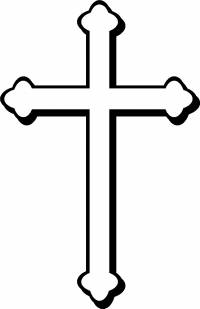The Catholic Church in England
The Catholic Church is the dominant religion across the British Isles, and Europe at large. The Church occupies a central role in society, and news of the construction of Cathedrals, the canonization of Saints and the election of Popes and Cardinals spread quickly across the Kingdom. Nevertheless the Church, with its intrigues, doctrinal squabbles and complex relationship with other religions, can only be fully known to members of its own Priesthood.
It is assumed that the religion of a PC/NPC, unless specified otherwise, is that of Roman Catholicism - and major events concerning the faith will be shown in the general news. However the complexities of the Church are more visible to those inside it: thus ordained members will also belong to (and receive news about) this faction.
Members of the Catholic Church worship the One True God. There can be no other gods but God. However, God is remote and busy, and does not directly interfere in the affairs of mortals. Therefore, all prayers and requests for aid must be made to God through the intercession of the saints, holy individuals who have access to the Divine power. Saints can be invoked via the use of their Relics, which are usually found on their altars. Some saints' relics are missing: they cannot be worshipped until those relics are found.
Major Doctrines
The doctrines of the Church in Misrule are largely the doctrines of the Concordat of Worms in 1107.
The Fey
The Pope has decreed that the Fey do indeed have souls; and should be accorded the respect due to any Christian. Each Fey is held to be capable of receiving the divine truth, and converting to the way of God. So far few have been particularly obliging, but there are no shortage of missionaries ready to help them see the light.
Notably the church does not sanction marriage between Fey and humans, as it believes God created marriage as a solely human institution.
Paganism
To be a Pagan is to live in sin, and to forfeit ones soul to eternal torment in Hell upon ones death. All godfearing Christians recognise that any works of magic authored by Pagans are in fact the tricks of ancient abominations, and all righteous men seek to lead Pagans from their troubled path onto that of the one true faith.
Nevertheless there is much dispute within the Church about the right course of action in this regard. Some, notably the Welsh Church, believe firmly in peaceful cooexistence. Others proselytise more aggressively. The most extreme advocates against the so called “Old Gods” are the Inquisition.
The Inquisition
The Inquisition is regarded as a heresy of the highest order and most insidious kind. To join this organisation, and defy Papal doctrine in the process, is a sin before God and Man: and merits severe punishment. The Inquition are considered as abominations just as much as the Pagans are.
Equality
The Church welcomes all as equal, and does not discriminate on the basis of sexuality or gender.
Ranks
Pope:
Supreme head of the Catholic Church, appointed by Christ himself through the sacred process of Petrine Succession, the Pope stands at the pinnacle of ecclesiastical authority. Although the history of the Papacy is littered with those who became (in effect) the prisoners of Kings and Emperors, an independent Pope can be as major a political player as any - after all there are few rulers who would risk excommunication, and the rebellions and wars it inevitably engenders.
Indeed the Pope is often called upon as an impartial judge to mediate on the secular and spiritual affairs of European kingdoms; and the last hope of many a wronged man is a petition to the Holy See itself.
Cardinal:
Electors and advisers of the Pope, and respected for their wisdom in Religious affairs, to be elected as a cardinal is to have proven oneself amongst the most devout in Christendom.
Archbishop:
Multiple dioceses are grouped together to form a single ecclesiastical province, over which an Archbishop (also known as a metropolitan) is placed. In addition to administering the ecclesiastical province, each Archbishop receives a diocese of her own.
Bishop:
Each bishop holds an important place as the centre of Christianity in her diocese. Bishops gain certain rights and privileges over the resources of the Catholic Church in their see; rights and privileges that are not always used for the greater good of the faith…
This rank and higher is not available at the start of the game, but may be earned. The ability to understand Latin is a prerequisite, granted by taking the Linqua Latina quirk.
Archdeacon/Abbot/Abbess:
Within a bishop's diocese, the arch-deacons then assist in the running of collections of parishes, and are able to make some use of the resources in the parishes, though are still accountable to the bishop.
You may start as an archdeacon if you take the Rank (Church) +2 quirk
Priests:
Priests are ordained members of the faithful, usually given responsibility over a single parish.
You may start as a Priest if you take the Rank (Church) +1 quirk
Monks and Nuns:
These individuals live communally in a monastery or nunnery governed by a given religious order. They take vows of obedience, poverty and chastity; and devote their lives to the study of theology and the worship of God.
Members of this faction by default start with the rank of Monk or Nun
Bishoprics of the British Isles
The most important diocese in Britain, and hence the most important Bishops, are as follows:
Archbishop of Canterbury
Current Officeholder: Elga Tuck
Archbishop of York
Current Officeholder: Reynard Obelyn
Bishop of London
Current Officeholder: John Neville
Bishop of Durham
Current Officeholder: Hugh De Puiset
Bishop of Edinburgh
Current Officeholder: Nellie Lovitt
Bishop of Cardiff
Current Officeholder: Gwydion fab Don
Bishop of Dublin
Current Officeholder: Catherine Glenham

